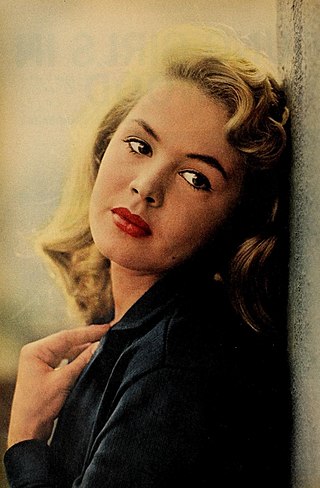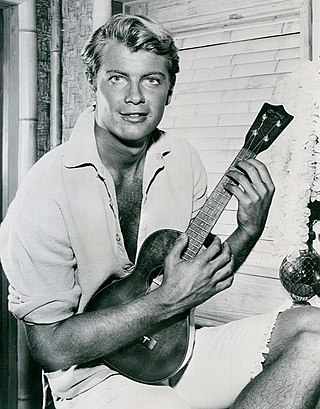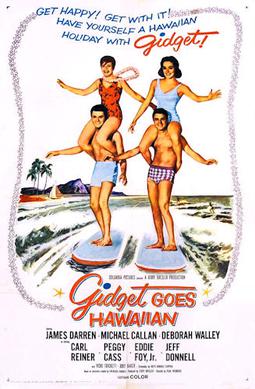
Dorothy Hackett McGuire was an American actress. She was nominated for the Academy Award for Best Actress for Gentleman's Agreement (1947) and won the National Board of Review Award for Best Actress for Friendly Persuasion (1956). She starred as the mother in the popular films Old Yeller (1957) and Swiss Family Robinson (1960).

Troy is a 2004 epic historical war film directed by Wolfgang Petersen and written by David Benioff. Produced by units in Malta, Mexico and Britain's Shepperton Studios, the film features an ensemble cast led by Brad Pitt, Eric Bana, Sean Bean, Brian Cox, Brendan Gleeson and Orlando Bloom. It is loosely based on Homer's Iliad in its narration of the entire story of the decade-long Trojan War—condensed into little more than a couple of weeks, rather than just the quarrel between Achilles and Agamemnon in the ninth year. Achilles leads his Myrmidons along with the rest of the Greek army invading the historical city of Troy, defended by Hector's Trojan army. The end of the film is not taken from the Iliad, but rather from Quintus Smyrnaeus's Posthomerica, as the Iliad concludes with Hector's death and funeral.

Sandra Dee was an American actress. Dee began her career as a child model, working first in commercials and then film in her teenage years. Best known for her portrayal of ingénues, Dee earned a Golden Globe Award as one of the year's most promising newcomers for her performance in Robert Wise's Until They Sail (1958). She became a teenage star for her performances in Imitation of Life and Gidget, which made her a household name.

Constance Ford was an American actress and model. She portrayed Ada Lucas Hobson on the long-running daytime soap opera Another World, from 1967 until shortly before her death in 1993. She also appeared in nearly two dozen movies from 1956 to 1974, with her most noteworthy role being the matriarch Helen Jorgenson in A Summer Place (1959).

Sylvia Sidney was an American stage, screen, and film actress whose career spanned 70 years. She rose to prominence in dozens of leading roles in the 1930s. She was nominated for the Academy Award for Best Supporting Actress for her performance in Summer Wishes, Winter Dreams in 1973. She later gained attention for her role as Juno, a case worker in the afterlife, in Tim Burton's 1988 film Beetlejuice, for which she won a Saturn Award for Best Supporting Actress.

Gidget is a 1959 American CinemaScope comedy film. The picture stars Sandra Dee, Cliff Robertson, James Darren, Arthur O'Connell, and the Four Preps in a story about a teenager's initiation into the California surf culture and her romance with a young surfer.

Richard Egan was an American actor. After beginning his career in 1949, he subsequently won a Golden Globe Award for his performances in the films The Glory Brigade (1953) and The Kid from Left Field (1953). He went on to star in many films such as Underwater! (1955), Seven Cities of Gold (1955), The Revolt of Mamie Stover (1956), Love Me Tender (1956), Tension at Table Rock (1956), A Summer Place (1959), Esther and the King (1960) and The 300 Spartans (1962).

Troy Donahue was an American film and television actor, best known for his role as Johnny Hunter in the film A Summer Place. He was a popular sex symbol in the 1950s and 1960s.

The beach party film is an American film genre of feature films which were produced and released between 1963 and 1968, created by American International Pictures (AIP), beginning with their surprise hit, Beach Party, in July 1963. With this film, AIP is credited with creating the genre. In addition to the AIP films, several contributions to the genre were produced and released by major and independent studios alike. According to various sources, the genre comprises over 30 films, with the lower-budget AIP films being the most profitable.

Gidget Goes Hawaiian is a 1961 American romantic comedy musical film starring James Darren, Michael Callan and Deborah Walley. Released by Columbia Pictures, the film is a sequel to the 1959 Sandra Dee beach film vehicle Gidget. Dee was under contract to Universal for the rival series film Tammy Tell Me True (1961) and would not be released to Columbia to reprise her hit role.

A Summer Place is a 1958 novel by Sloan Wilson, and follows his 1955 bestseller The Man in the Gray Flannel Suit. The novel is about an adult couple who rekindle a long-ago summer romance that ended because of class differences, and their two teenage children from other marriages who also fall in love with each other. It was adapted into the 1959 film A Summer Place.

Beach Blanket Bingo is a 1965 American beach party film directed by William Asher. It is the fifth film in the Beach Party film series. The film stars Frankie Avalon, Annette Funicello, Linda Evans, Deborah Walley, Paul Lynde, and Don Rickles. Earl Wilson and Buster Keaton appear. Evans's singing voice was dubbed by Jackie Ward.
"Theme from A Summer Place" is a song with lyrics by Mack Discant and music by Max Steiner, written for the 1959 film A Summer Place, which starred Sandra Dee and Troy Donahue. It was recorded for the film as an instrumental by Hugo Winterhalter. Originally known as the "Molly and Johnny Theme", this lush extended cue, as orchestrated by Murray Cutter, is not the main title theme of the film, but an oft-heard secondary love theme for the characters played by Dee and Donahue. The theme has become a canonical representation of the easy listening genre, and is considered by some to be the definitive easy listening track of all time.

Imitation of Life is a 1959 American drama film directed by Douglas Sirk, produced by Ross Hunter and released by Universal International. It was Sirk's final Hollywood film and dealt with issues of race, class and gender. Imitation of Life is the second film adaptation of Fannie Hurst's 1933 novel of the same name; the first, directed by John M. Stahl, was released in 1934.

Parrish is a 1961 American drama film made by Warner Bros. It was written, produced and directed by Delmer Daves, based on Mildred Savage's 1958 novel of the same name. The music score was by Max Steiner, the Technicolor cinematography by Harry Stradling Sr., the art direction by Leo K. Kuter and the costume design by Howard Shoup. The film stars Troy Donahue, Claudette Colbert, Karl Malden, Dean Jagger, Connie Stevens, Diane McBain, Sharon Hugueny, Sylvia Miles, Madeleine Sherwood and Hayden Rorke.

Monster on the Campus is a 1958 American black-and-white science fiction/horror film from Universal-International, produced by Joseph Gershenson, directed by Jack Arnold, from a script by David Duncan, that stars Arthur Franz, Joanna Cook Moore, Nancy Walters, Troy Donahue, and Whit Bissell. The film was theatrically released as a double feature with the British horror film Blood of the Vampire.

Palm Springs Weekend is a 1963 Warner Bros. bedroom comedy film directed by Norman Taurog. It has elements of the beach party genre and has been called "a sort of Westernized version of Where the Boys Are" by Billboard magazine. It stars Troy Donahue, Stefanie Powers, Robert Conrad, Ty Hardin, and Connie Stevens.

Hack! is a 2007 American horror film directed and written by Matt Flynn. The film centres on a group of students who, while on a field trip, become victims in a snuff film, and stars Danica McKellar, Jay Kenneth Johnson, William Forsythe, Sean Kanan, Juliet Landau, Justin Chon, Travis Schuldt, Adrienne Frantz and Gabrielle Richens. The film was released in the UK on July 20, 2007, before receiving a US release on December 11, 2007.

Mrs. Clinton Walker House, also known as Cabin on the Rocks, is located on Carmel Point, near Carmel-by-the-Sea, California. It has the appearance of a ship with a bow cutting through the waves. The house was designed by Frank Lloyd Wright in 1948 and completed in 1952 for Mrs. Clinton "Della" Walker of Pebble Beach. It was listed on the National Register of Historic Places on November 17, 1977.

Mission Ranch is a historic hotel and restaurant in Carmel, Monterey County, California, United States. It is located in the unincorporated Mission Tract south of the incorporated city of Carmel-by-the-Sea, near the Carmel Mission, at 26270 Dolores Street. The property was bought in 1986 by Clint Eastwood, who restored the premises in the style of the original buildings. The hotel has 31 rooms located within ten buildings on the property.




















